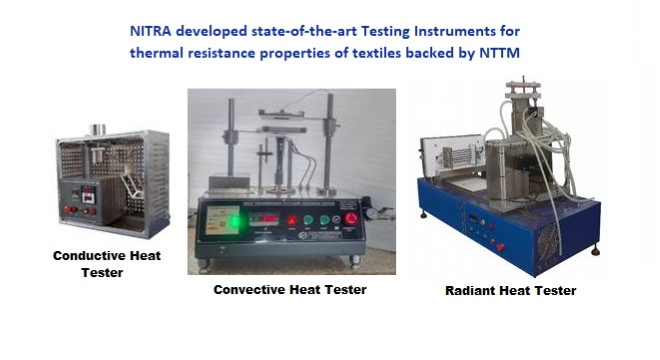
NTTM Drives Self-Reliance: Indigenous Thermal Testing Instruments Cut Costs And Time For Protective Textiles
The
National Technical Textiles Mission (NTTM) is significantly strengthening India’s
high value protective textiles segment by fostering a new era of indigenous
technological self-reliance. A pivotal development, spearheaded by the Northern
India Textile Research Association (NITRA) with support from the Ministry of
Textiles, has resulted in the successful creation of three state-of-the-art
instruments for evaluating critical thermal resistance properties. These precision
systems such as the Convective Heat Tester (ISO 9151), Radiant Heat Tester (ISO
6942), and Contact (Conductive) Heat Tester (IS 12127) are essential for
quality assurance in high performance applications such as fire-fighter suits,
industrial safety gear, and defence apparel.
This
Make in India initiative marks a transformative moment for Indian industry stakeholders
seeking to make data driven decisions. Previously, reliance on imported
equipment meant instruments were priced steeply between ₹15–40 lakh. The new,
domestically developed models are available at a fraction of the cost, ranging
from a highly accessible ₹5–10 lakh, representing a cost reduction of up to
75%. Furthermore, the commercial availability of this technology is a game
changer for manufacturing speed and market access. Testing duration has plummeted
from approximately 30 days to a mere 3–5 days, drastically improving time to market.
Crucially,
the cost of testing a single sample has dropped from a prohibitive ₹25,000–₹40,000
to a highly competitive ₹6,000–₹10,000. With the technology already
successfully transferred for commercial production and validated at institutions
like CFEES, DRDO, Indian manufacturers now possess the necessary, affordable
infrastructure to compete globally and make rapid, data driven decisions on
protective textile quality. This move firmly establishes India’s technological
capability in this niche, high value segment.
This Make in India initiative marks a transformative moment for Indian industry stakeholders seeking to make data driven decisions. Previously, reliance on imported equipment meant instruments were priced steeply between ₹15–40 lakh. The new, domestically developed models are available at a fraction of the cost, ranging from a highly accessible ₹5–10 lakh, representing a cost reduction of up to 75%.
If you wish to Subscribe to Textile Excellence Print Edition, kindly fill in the below form and we shall get back to you with details.











